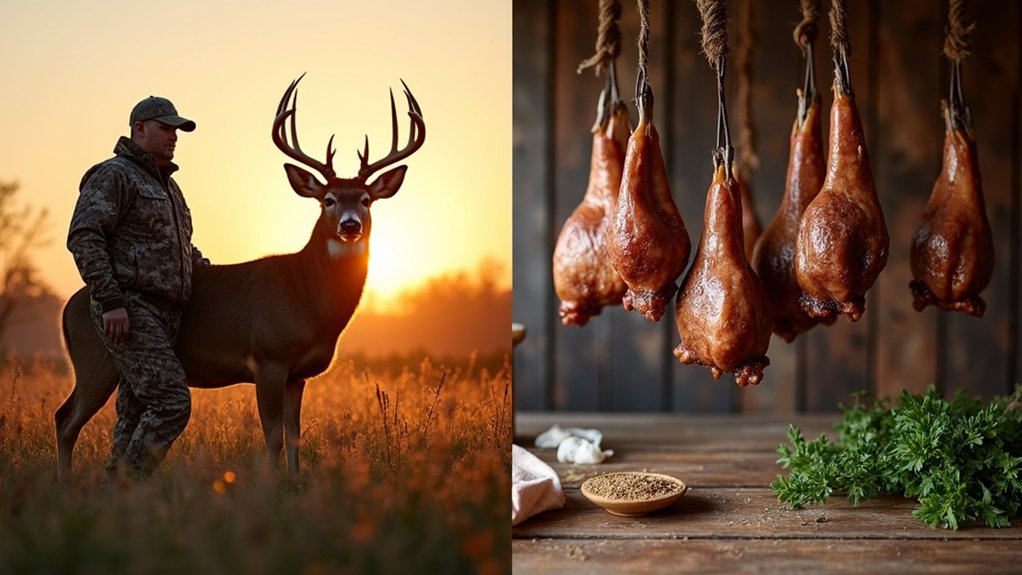When it comes to hunting, you might find yourself torn between sport hunting and food hunting. Each has its own appeal, driven by different motivations and ethical considerations. Understanding these distinctions is essential, especially as both practices impact wildlife and local economies. So, what really sets them apart? Let’s explore the nuances that define each approach and the implications they carry.
What is Sport Hunting vs Food Hunting?
When you think about hunting, you might picture two distinct motivations: sport hunting and food hunting.
Sport hunting focuses on the thrill of the chase and the challenge of tracking animals, often for trophies or recognition. It’s about the experience and skill involved rather than necessity.
On the other hand, food hunting emphasizes sustenance; you hunt primarily to gather meat for your family or community. This type often involves a more practical approach, ensuring you utilize what you harvest.
Both types involve similar skills but differ in purpose, ethics, and the emotional connection you have with the hunt.
Why Do People Engage in Sport Hunting?
While some might question the ethics of sport hunting, many people engage in it for a variety of reasons that go beyond mere enjoyment. You might find thrill in the challenge of tracking and outsmarting an animal, testing your skills in a natural setting.
Additionally, sport hunting often fosters a sense of camaraderie among friends and family, creating lasting memories. Many hunters appreciate the connection to nature, experiencing the outdoors in a unique way.
Conservation efforts also play a role, as hunters often contribute to wildlife management and habitat preservation. Ultimately, sport hunting can be about adventure, connection, and responsibility.
What Are the Ethical Considerations of Food Hunting?
Although many view food hunting as a necessary means of obtaining sustenance, it raises important ethical considerations that can’t be ignored.
When you think about food hunting, consider these factors:
- Animal Welfare: Are you ensuring a quick, humane kill, or could it lead to unnecessary suffering?
- Sustainability: Are you hunting in a way that supports ecosystem balance, or are you depleting resources?
- Cultural Impact: How does your hunting practice affect local communities and their traditions?
How Does Sport Hunting Impact Wildlife Conservation?
Sport hunting can play a complex role in wildlife conservation, often intertwining with efforts to protect and preserve natural habitats.
When managed properly, sport hunting can generate revenue that supports conservation initiatives. By regulating hunting quotas, authorities can maintain healthy populations and reduce overpopulation, which may lead to habitat degradation. You might also find that hunting fees fund crucial research and preservation programs.
However, if not managed sustainably, it can threaten vulnerable species and ecosystems. It’s essential to strike a balance, ensuring that sport hunting contributes positively to conservation while safeguarding wildlife for future generations.
What Are the Economic Benefits of Food Hunting?
Many people find that food hunting offers significant economic benefits, particularly in rural areas.
By engaging in food hunting, you can contribute to local economies in several ways:
- Reduced Grocery Costs: Harvesting your own game can lower your food expenses, allowing you to save money on groceries.
- Job Creation: Food hunting can stimulate local businesses, from guiding services to equipment sales, creating jobs in the community.
- Sustainable Practices: By sourcing food locally, you support sustainable practices, which can enhance agricultural and wildlife management efforts.
In short, food hunting can be a win-win for both your wallet and the local economy.
How to Choose Between Sport Hunting and Food Hunting?
Choosing between sport hunting and food hunting can be a personal decision influenced by various factors.
First, consider your motivations—are you looking for a thrilling experience or a way to provide for your family?
Next, think about your skills and expertise; sport hunting might require different techniques compared to food hunting.
Also, evaluate your local regulations and community attitudes toward each type.
Finally, assess your resources: time, budget, and equipment can all play pivotal roles.
Ultimately, reflect on what aligns best with your values and lifestyle, ensuring your choice resonates with your personal beliefs and goals.
What Are the Legal Regulations Surrounding Sport and Food Hunting?
While traversing the world of hunting, it’s essential to understand the legal regulations that govern both sport and food hunting. These laws vary by region but typically include:
- Licensing Requirements: You must obtain specific licenses or permits for hunting activities.
- Seasonal Restrictions: Hunting is often restricted to certain seasons to protect wildlife populations.
- Bag Limits: There are limits on the number of animals you can harvest, ensuring sustainable practices.
Familiarizing yourself with these regulations not only keeps you compliant but also promotes ethical hunting practices, ensuring future generations can enjoy this outdoor activity responsibly.
How Can Sport Hunting and Food Hunting Coexist?
Although sport hunting and food hunting may seem at odds, they can actually coexist harmoniously when approached with mutual respect and understanding.
By recognizing each other’s values, hunters can create a shared space that honors conservation efforts. You can promote sustainable practices that benefit wildlife and their habitats, ensuring that both forms of hunting contribute positively to ecosystems.
Open dialogue helps bridge gaps between different hunting communities. By respecting regulations, practicing ethical hunting, and sharing knowledge, you can foster a culture where sport and food hunting not only coexist but also support one another in preserving wildlife and natural resources for future generations.
